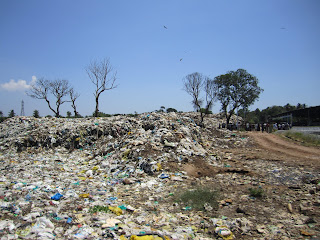Astamudi Lake is the water reservoir in kollam. The beautiful place near the bank of the river is a Dump yard. There is no method of processing this waste. Due to which the waste brings out dirty scrub of water which flows into the river. Hygiene problems are a great concern. People suffer with all sort of diseases here as this dump yard is in middle of residential area completely packed with people. This place is one of the beautiful places in Kollam with back waters.Continued ... at the bottom
This Dump Yard can accommodate up to only 40 tonnes only. Now from all parts 120 tonnes are dumped daily. Garbage lying there for months had started emitting unbearable stench which had spread for about 5 km.People from here are fighting for the past one decade to get this rid off or atleast have a plant to mobilize this. Now the Dump yard is in its full capacity.CRZ regulation says that waste can be dumped only after 100 m from the lake shore, this is also been ignored.The complex being situated on the banks of the Ashtamudi Lake, filth from there had started seeping into the lake and polluting it. The whole complex had become a mosquito breeding ground.
The present solid waste treatment system for Kollam city involves open dumping of solid waste at the Disposal site about 5 kilometers away from the city centre at Kureepuzha. Large quantity of waste is accumulated at the site as a result of dumping during last two decades. The operations are not engineered or controlled, leading to leachate and windblown waste polluting surrounding areas. Occasionally, waste is pushed by the excavator loader to clear access and to make room for further dumping. Except for a small room for watchman no infrastructure is available at the site
A recent study has concluded that the pollution level of groundwater near the solid waste dumping site of the Kollam City Corporation at Kureepuzha has reached alarming proportions.
The study, conducted by the Zoology Department of Fatima Mata National College and the Environmental Sciences Department of the University of Kerala, was published in the latest edition of the Research Journal of Chemistry and Environment. The team was led by Sherly Williams and comprised Razeena Karim and D.S. Jaya. The study reports severe bacterial contamination of open wells in the vicinity of the site, caused by leachates from garbage.
‘Boil for 20 minutes'
The study proposes that people should drink water from these wells only after boiling it for at least 20 minutes. High physico-chemical and bacteriological contamination was recorded in the water of Ashtamudi Lake course along the waste dumping site.
Since the wells in the area are the chief source of potable water, those living near the dumping site are vulnerable to water-borne diseases. Leachate reduces the oxygen content in the water, posing a threat to the aquatic life of the lake.
While the Corporation estimates that 108 metric tonnes of solid waste is generated each day in the city, waste quantification and characterisation surveys conducted in the city as part of the study puts the figure at about 164 metric tonnes.
A significant portion of the waste is dumped on the streets or open collection points, causing severe pollution in the city. Only about 18 per cent of the waste reaches the Kureepuzha dumping site. Since there is no waste treatment system in the city, the entire solid waste collected is dumped at this site. In fact, waste collected in the past several years lay accumulated at the site.
Dr. Williams said that the team is conducting further studies to assess hazard to various aquatic life in Ashtamudi Lake near the dumping site.
We are struggling to have justice. District collector and other higher officials never turn up as they know the real situation here.
Please take this case on higher priority and do something to save this river and also the lifes of 1000’s











No comments:
Post a Comment